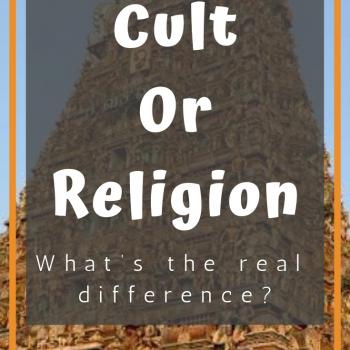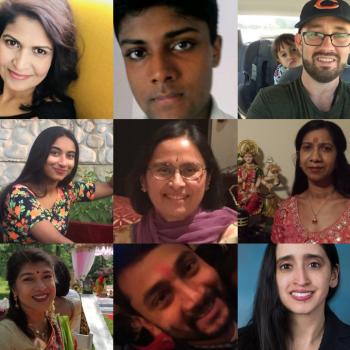There was a very interesting hashtag discussion on Twitter #BeingAWhiteMuslim and I enjoyed reading the thoughts people expressed (though darn it, I want cool Hindu hashtags! Can we get some of those please?). I could certainly see some parallels with my experience as a white western person in an eastern religion. One person linked to an article called The Problem with White Converts and it made some great points about the “universalism” that we’ve been talking about lately.
I explained recently how many of the people I know mean to praise Hinduism when they say that “all religions are the same” and this article does a great job pointing out another flaw with that declaration that I did not notice. Believing that Hinduism contains the purest Truth can sometimes mean stripping what you don’t understand or don’t like from it in order to make it fit the vision that you have for it.
The article talks about two early white converts to eastern religions: one a Buddhist and one a Muslim. With both he points out that they believed in the message of the Theosophists who were some of the original people saying that all religions were the same at their core.
This was not a Buddhism based on Olcott’s encounters with Buddhist tradition as people actually lived it in the world, but only the “true Buddhism” that he found in the Buddha’s original message. Olcott’s “true Buddhism” was necessarily contrasted with what he saw as the superstitions and corruptions of uneducated, uncivilized Buddhist masses. In other words, Olcott converted to Buddhism and then claimed to understand the Buddha better than every other Buddhist on the planet. (emphasis mine)
I can see that there is a real danger in seeing what you want to see in a religion that’s new to you.
Science and reason represented Islam’s “true spirit” as Webb understood it, but as in the case of Olcott, Webb needed to detach Islam’s “true spirit” from the Islam of everyday Muslims.
… They believed that Buddhists and Muslims had contaminated their originally “pure” religions with lowly culture, but Olcott and Webb could not see the ways in which their own cultures directed their readings of Buddhism and Islam.
…When people assume that “religion” and “culture” exist as two separate categories, culture is then seen as an obstacle to knowing religion. In this view, what born-and-raised members of a religious tradition possess cannot be the religion in its pure, text-based essence, but only a mixture of that essence with local customs and innovated traditions. The convert (especially the white convert, who claims universality, supreme objectivity, and isolation from history, unlike the black convert, whose conversion is read as a response to history), imagined as coming from a place outside culture, becomes privileged as the owner of truth and authenticity. People forget that these white guys aren’t simply extracting “true” meaning from the text, but bringing their own cultural baggage and injecting it into the words.
It’s hard not to just paste the entire thing here verbatim! Definitely a great read. I’ve got to check out this guy’s books.
This is an aspect of being a white convert that I try to be vigilant against in my own behavior and thoughts. It’s important to me to come to Hinduism with humility and respect. It’s important to me to not remake it and change it to suit my purposes.
It’s a balance, though, because I believe that we have the universal Self within us, so somewhere in us we instinctively know Truth. A guru can guide us to the point where we can begin to understand things for ourselves, to the point where we can recognize the voice of God within us. While we do have the Truth already, it’s important to remember that the ego is very strong and difficult to defeat. The ego will trick us into thinking that we’re uncovering Truth when we’re actually dismissing a core element of our tradition because it is different from our own cultural background and experience.
For most of us it is better to be listening than to be teaching. While this blog may look like a place for me to educate others, that is not its purpose. I’m here to bring up questions and concerns that I have, things I think about, things I wonder about, things I worry about, and get other perspectives on those things. You are a critical part of what this blog is! I learn every day. I may bring up a topic, but the real core of this blog is the comments. The discussion that comes up around that topic is what I’m here for.











